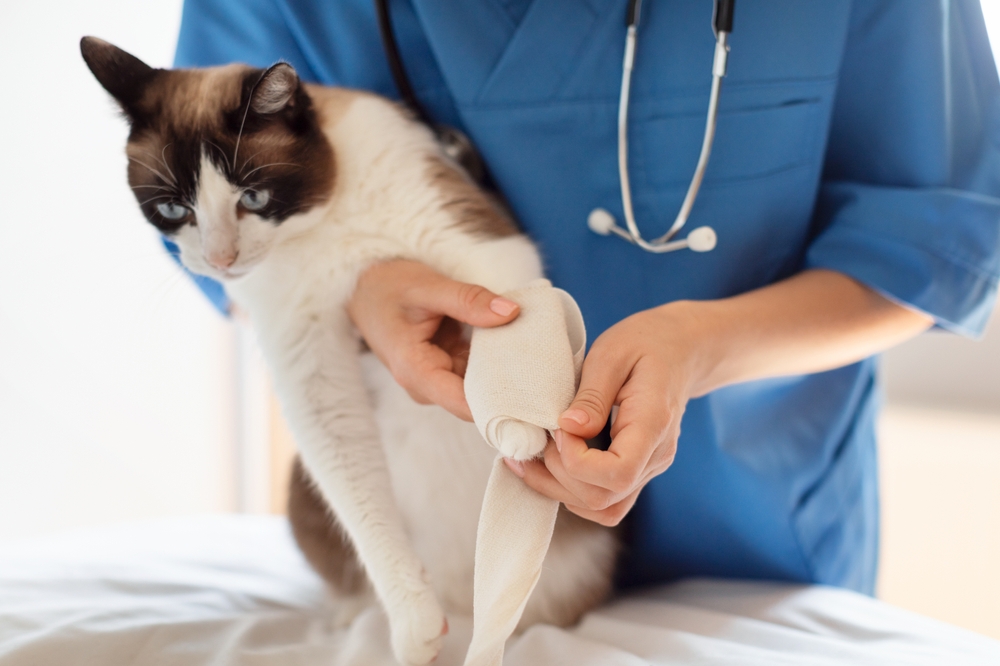Urgent and emergency care often overlap in veterinary medicine, challenging you to handle your pet’s health issues efficiently and confidently. Knowing the difference between these two care types and what constitutes a true emergency can help you make informed decisions about your furry pal’s health. Our Lytle Veterinary Clinic team explores the distinctions between urgent and emergency veterinary care, provides example scenarios, and offers tips to prepare you for your pet’s unexpected veterinary care needs.
What is urgent veterinary care?
Urgent veterinary care is appropriate for non-life–threatening conditions that require prompt attention. In these situations, waiting too long could cause your pet significant discomfort or risk their health, but the condition is unlikely to cause serious complications or death within a few hours. Urgent care facilities are open evenings and weekends but do not offer overnight hospitalization or 24-hour-per-day, seven-days-per-week care.
Common urgent veterinary care scenarios
Urgent care and emergency care can sometimes overlap. Generally, the conditions seen in urgent veterinary care facilities are similar to those of people who go to urgent medical care facilities. Examples include:
- Cuts and wounds
- Vomiting or diarrhea for fewer than 24 hours
- Ear infections
- Urinary tract infections (UTIs)
- Minor lameness
- Eye irritation
- Unexplained pain or behavior change
- Decreased appetite
- Lethargy
What is emergency veterinary care?
Emergency veterinary care is appropriate for life-threatening conditions that require immediate medical intervention to prevent a pet’s death or severe health complications. Emergencies are critical situations for which delaying treatment could prove fatal. Emergency facilities are equipped to handle severe illness or injury, including overnight and intensive care capabilities. Many emergency facilities also house or have close relationships with veterinary specialists.
Common emergency veterinary care scenarios
When presented to the emergency veterinary facility, true emergencies are immediately seen. If urgent care facilities aren’t available nearby or are closed, emergency veterinary hospitals will also treat pets in need of urgent care. However, stable pets must wait their turn after critical cases, while urgent care facilities have shorter wait times. Emergency veterinary care scenarios include:
- Trauma (e.g., fall, animal bite, hit by car)
- Difficulty breathing
- More than one seizure in 24 hours
- Poisoning
- Severe bleeding or bruising
- Inability to urinate
- Moderate to severe pain
- Weakness or paralysis
- Collapse
- Heatstroke
Prepare for urgent and emergency pet veterinary care needs

Preparation is critical for ensuring you know what to do, who to call, and where to go if your furry pal needs unexpected care. Here are a few tips to help you prepare:
- Familiarize yourself with local veterinary facilities — Research and keep a list of the nearest emergency and urgent veterinary hospitals. Learn their hours, which facilities have specialists, and whether around-the-clock veterinary care is available. Keep the information in your phone or written on a paper where you store your pet supplies.
- Learn pet first aid — Maintain a pet first aid kit that includes items such as bandages, antiseptic wipes, saline, and a digital thermometer. Familiarize yourself with basic pet first aid procedures by taking an online or in-person course. This knowledge can help you think clearly and take immediate action if your pet has a veterinary emergency.
- Monitor your pet’s health — Early detection and treatment of your pet’s health status changes can often prevent conditions from becoming emergencies. Take note of changes in your pet’s habits so you can bring them up with our veterinary team during your furry pal’s routine annual checkup.
Understanding the difference between urgent and emergency veterinary care is essential for all pet owners. While urgent care situations require prompt attention, emergencies demand immediate action. Our Lytle Veterinary Clinic team understands that many pet health scenarios are unclear, and we’re here to answer questions and guide you on your furry pal’s health journey. Contact us to learn more about preparing for an emergency or to schedule a routine or urgent care visit.

